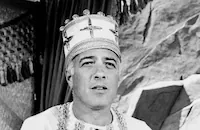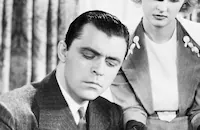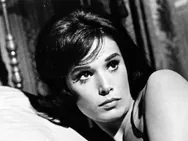The Great Man

Brief Synopsis
Cast & Crew
Jose Ferrer
Jose Ferrer
Dean Jagger
Keenan Wynn
Julie London
Joanne Gilbert
Film Details
Technical Specs

Synopsis
After the star of Amalgamated Broadcasting Studios, radio and television humorist Herb Fuller, dies, Fuller's former manager, Sid Moore, immediately plans a lavish memorial. Moore announces to Amalgamated reporter and radio personality Joe Harris that he wants Joe to research and narrate the memorial, in order to position Joe to take over Fuller's empire. Moore convinces Joe to accompany him to the Connecticut hospital in which Fuller died, but there they learn only that Fuller's last words were unprintable. On the plane home, Moore, who feels that he "created" Fuller only to be cut out of the star's later career, begins his plan to launch Joe into stardom by pretending that Joe was a close friend of Fuller, who in reality was a stranger to him. As Moore has planned, Joe is soon invited to a meeting in Amalgamated president Philip Carleton's office, during which Moore outlines his elaborate plans for the viewing of Fuller's casket, in a chapel with rotating choirs and all-day eulogies. Carleton makes it clear that although he approves of the exploitation, he dislikes Moore and will not yet allow Joe to take over Fuller's shows. Instead, he gives Joe four days in which to "investigate" Fuller's past and, with the resulting information, create the radio homage. After the meeting, Moore coerces Joe into signing a contract guaranteeing their partnership. To begin his investigation, Joe questions Fuller's press agent, Nick Cellantano, who reveals what Joe has already begun to discern: Fuller was a callous, shallow womanizer, loved only by the audience members who considered him a kindly, humorous everyman. Cellantano counsels Joe to use prepared press clips in the memorial, rather than obtaining unusable quotes about the real man. Back at his office, after Joe's beloved secretary Ginny discloses that Fuller once propositioned her, Moore calls and commands Joe to extract glowing quotes from "the great unwashed" who are thronging to see Fuller's casket in the chapel. Some of the people there whom Joe interviews genuinely adored Fuller, while others are merely enjoying the spectacle of his death. Later, Carol Larson, the singer on Fuller's television program, invites Joe to her apartment. There, the lovely young woman drunkenly declares that she "belonged to" Fuller, who seduced her, made her a star and then sadistically kept her at his beck and call. After kissing Carol, Joe leaves, with hours of unusable tape. The next morning, Fuller's band leader, Eddie Brand, storms into Joe's office with a prepared speech about Fuller's magnanimity. In confidence, he advises Joe just to tell the people what they want to hear about Fuller, "the great man." Engineer Mike Jackson then demonstrates the edited and manipulated chapel tapes, which now sound universally positive about Fuller. Joe, who is disturbed by what he has learned about Fuller but is unwilling to ruin the opportunity to advance his career, returns to his office, where he finds the owner of a Christian radio station, Paul Beaseley. Although Joe initially considers the mild-mannered man ridiculous, he gains respect for Paul as the radio owner reveals his past relationship with Fuller: Paul gives the young Fuller his first program after he wins a sermon-writing contest. Fuller moves in with the Beaseleys, who treat him like a son, taking advantage of their kindness by drinking too much and writing increasingly smutty programs. Finally, Moore hires Fuller away, after which Fuller never again spoke to the Beaseleys. In the present, Paul wonders why he and Joe help maintain the image of Fuller as a saint, and when Joe answers that this job is his most important ever, Paul chastises him gently for his shallowness. The next day, Joe listens to Fuller's most famous broadcast, in which he brought donated blood to the German front during World War II, thus inspiring millions of Americans to give blood. Joe is moved by the show, and considers it the first example of authentic integrity he has discovered about Fuller. The night before the show, Joe is invited to Moore's house, where the manager is romancing a beautiful young Amalgamated receptionist. In response to Moore's boasts that he knew the real, vulgar Fuller, Joe threatens to back out of the program, but Moore announces that he and Mike have already created a backup show and can replace Joe instantly. Moore then reveals that he falsified the "blood tapes" after Fuller refused to leave Paris for the front, taping Fuller's voice over phony background noises. Raving that although he kept Fuller's secret, Carleton refused to pay him off, Moore announces that he now plans to control Fuller's empire. Disgusted, Joe returns to his office, where he stays all night. In the morning, Carleton reveals to Joe that he is launching a campaign to discredit him, knowing that when Joe is no longer a viable property, Moore will no longer fight for control over him. He gives Joe $500 to buy out the contract, promising that once Moore is no longer attached, they will back Joe as Fuller's replacement. Although this jeopardizes his career, Joe has no choice but to accept. When the broadcast begins that evening, Carleton and Moore listen from the president's office. Joe begins with his scripted memorial but soon is unable to continue the charade. Placing aside his manuscript, Joe unleashes an honest expose of Fuller, shocking the nationwide audience. When Moore tries to pull the show off the air, however, Carleton stops him, explaining that now Joe's name will stand for integrity and grit. Joe's new commercial appeal, Carleton declares, will not only render Moore powerless, but will be the perfect platform from which to sell more products. Not knowing that the men upstairs are planning his future as the next "great man," Joe continues his program.

Director

Jose Ferrer
Cast

Jose Ferrer

Dean Jagger

Keenan Wynn

Julie London
Joanne Gilbert
Ed Wynn

Jim Backus
Russ Morgan

Edward Platt
Robert Foulk

Lyle Talbot
Vinton Hayworth
Henny Backus
Janie Alexander
Vikki Dougan
Robert Schwartz
Johnny Grant
Jane Howard
Colleen Mcclatchey
Herbert Baker

Richard Benedict
Alexander Campbell
Hallene Hill
Steve Pendleton
Adrienne Marden

Barrie Chase
Kay Stewart
Dorothy Abbott
Eddie Gomez
Gail Anne Stone
Al Morgan
Harlan Hoagland
Crew
Phil Bowles
Leslie I. Carey
Leon Charles
Leon Charles
Jose Ferrer
Russell A. Gausman
Joseph Gershenson
Al Joseph
Ruby R. Levitt
Harold Lipstein
Al Morgan
Eric Orbom
Richard H. Reidel
Aaron Rosenberg
Ed Sandlin
Joe Sikorski
Joan St. Oegger
Herman Stein
Bill Thomas
Sherman Todd
Bobby Troup
Bud Westmore
Frank H. Wilkinson
Leah Worth

Film Details
Technical Specs

Articles
The Great Man -
The film was directed by actor José Ferrer, who also starred as Joe Harris, popular radio reporter on the Broadway beat. When beloved personality Herb Fuller is killed in a car crash, Philip Carleton (Dean Jagger), the president of the Amalgamated Broadcasting Network assigns Harris to put together a memorial for Fuller, complete with a public viewing and a retrospective radio program, featuring interviews with those who knew and worked with Fuller. Carleton tells Harris that if he does a good enough job, he might become Fuller's replacement. As Harris digs into Fuller's life, he sees that the private man was very different from the public persona. Also in the cast were Ed Wynn, his son, Keenan Wynn, Jim Backus, Julie London, bandleader Russ Morgan, a pre-"Get Smart" Edward Platt, and Lyle Talbot.
The Great Man was shot at the Universal Pictures Building in New York City (which doubled for the "Amalgamated Broadcasting" building), as well as various locations across the city, and at the Universal Studios lot in California. According to film critic and author Pauline Kael, Ed Wynn, who had begun his career as a comedian, and later went on to make several impressive dramatic appearances in the 1950s and 1960s, did his six-minute scene in only one take. That performance earned Wynn a Golden Globe nomination as Best Supporting Actor for 1958 and a British Academy of Film and Television Award nomination for Best Foreign Actor. The Directors Guild of America honored José Ferrer with a nomination for Outstanding Directorial Achievement in Motion Pictures.
The normally crusty New York Times film critic Bosley Crowther praised The Great Man in his review, calling it "a smashingly brutal and generally absorbing exposé of a piece of deception and hypocrisy within the radio industry. [...] It becomes a study of the reporter's personal conflict with a gang of mercenary hypocrites. As such, it is wickedly reflective of a commercial and social attitude that is sometimes held by cynics to be typical of "Madison Avenue."
SOURCES: Crowther, Bosley "Screen: The Great Man" The New York Times 2 Jan 57
The Internet Movie Database
Kael, Pauline 5001 Nights at the Movies
By Lorraine LoBianco

The Great Man -
Quotes
Feet of clay, huh?- Ginny
Right up to the knees, at least.- Joe Harris
Trivia
Notes
According to a October 24, 1955 Daily Variety item, when Universal bought the rights to Al Morgan's novel The Great Man, the agreement included hiring Morgan as the film's screenwriter. Contemporary reviews also noted that Morgan supplied the voice of Fuller, heard during the scene in which "Joe Harris" listens to Fuller's audiotapes. On October 26, 1955, a "Rambling Reporter" item in Hollywood Reporter announced that either José Ferrer or Steve Allen would play the lead role. The item also suggested that the character of "Herb Fuller" was based on popular radio personality Arthur Godfrey (1903-1983), a rumor repeated by other contemporary sources. Studio press materials noted that although the film followed the novel closely, it eliminated a few characters and condensed the time span of the story slightly. In February 1956, "Rambling Reporter" noted that Curd Jurgens was being considered for a role in the film, and Hollywood Reporter reported in April 1956 that Mona Freeman had been signed to a starring role. Neither appears in the final film.
The Great Man marked the first film in which father and son actors Ed and Keenan Wynn appeared, although they do not share any scenes. Studio press materials pointed out that "Paul Beaseley" was the first dramatic character ever played by Ed Wynn. Tony Curtis' brother, actor Robert Schwartz, made his feature film debut in the The Great Man, as did Vikki Dougan. According to press materials, the filmmakers used the exterior of Universal-International's New York office as the facade of the "Almagamated Broadcasting Studios."

Miscellaneous Notes
Released in United States Winter February 1957
Released in United States Winter February 1957














